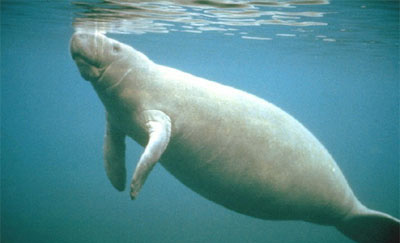Manatees – those comically blimp-like “sea cows” whose gentle, lumbering ways also made them susceptible to the threats that nearly killed them off as a species – are no longer endangered.
The U.S. Fish and Wildlife Service announced Thursday that it would downgrade the West Indian manatee from “endangered” to “threatened” under the Endangered Species Act.
The reclassification marked an astounding rebound for the animals, which hovered on the brink of extinction when they were first listed as endangered in 1973. Then, only a few hundred manatees remained. Today, there are an estimated 6,620 Florida manatees, a subspecies of the West Indian manatee, according to the Fish and Wildlife Service.
“While there is still more work to be done to fully recover manatee populations, particularly in the Caribbean, manatee numbers are increasing and we are actively working with partners to address threats,” Jim Kurth, the federal agency’s acting director, said in a statement.
#WildlifeWin! Thanks to working together, increases in habitat & population, manatees are now listed as threatened. https://t.co/4FjnIN0zj6 pic.twitter.com/OH3ZS8IJ4J
— US Fish and Wildlife (@USFWS) March 30, 2017
However, some animal groups and others protested the federal agency’s decision, saying the manatee’s removal from the endangered list could lead to greater threats to the species in the long run.
Rep. Vern Buchanan, R-Fla., called it “HUGELY disappointing” and promised to reach out to Interior Secretary Ryan Zinke.
The congressman said the move would be detrimental for Florida, where the manatee is so beloved and protected that it has its own specialty license plate.
The nonprofit Save the Manatee Club pointed out there were no plans to reduce watercraft-related manatee deaths, which have reached a “record high” in recent years. It also said the Fish and Wildlife Service has no long-term plan to deal with the anticipated loss of the artificial warm-water habitat that 60 percent of Florida manatees depend on in the winter. In addition, the group called out President Donald Trump for threatening to do away with environmental regulations, including those that protect wildlife and water quality.
“We believe this is a devastating blow to manatees,” Patrick Rose, executive director of the Save the Manatee Club, said in a statement. “A federal reclassification at this time will seriously undermine the chances of securing the manatee’s long-term survival. . .. With the new federal administration [threatening] to cut 75% of regulations, including those that protect our wildlife and air and water quality, the move to downlist manatees can only be seen as a political one.”
The Center for Biological Diversity also opposed the federal reclassification, calling 2016 “the deadliest year to date” for the animals and noting that the biggest threats to manatees – boat strikes and habitat loss – “persist today at virtually the same rates” as in the 1970s.
A study by the nonprofit conservation group found that boat collisions killed at least 668 manatees between 2008 and 2014.
“Despite this, both the Service and Army Corps of Engineers continue to authorize construction of thousands of projects that facilitate increased watercraft access to Florida waters,” the group said.
Indeed, cases illustrating the threats that manatees face continue to crop up. Last fall, Tampa zoo workers rescued an orphaned manatee calf, nicknamed Emoji, and found the calf’s stomach full of plastic bags and debris. Ingested trash protruded from his rectum, The Post’s Kristine Phillips reported. A veterinarian surmised that the calf, after being forced to look for food on his own, had eaten plastic bags from the ocean floor.
Emoji died three months after his rescue.
Even various efforts to protect manatees have been controversial.
In 2015, the Florida Fish and Wildlife Conservation Commission imposed greater restrictions on human activity at Three Sisters Springs inside the Crystal River National Wildlife Refuge, a winter haven for hundreds of manatees. Among its efforts, the state agency closed two of its three entry points into the springs to the public – but stopped short of a swimming embargo.
The following month, a group called Public Employees for Environmental Responsibility threatened to sue the state agency if it didn’t ban “swim-with” programs across Florida. Refuge officials defended the experiences as having helped make some visitors “a lot more conservation-minded.”
Today, swim-with-manatee programs remain a popular and hotly debated tourist attraction in Florida.
The Fish and Wildlife Service emphasized in its announcement Thursday that existing federal protections for manatees would remain in place, despite their removal from the endangered list. The agency credited efforts by Florida, as well as Puerto Rico, Caribbean countries and public and private organizations, for the West Indian manatee’s comeback.
“The Fish and Wildlife Service has worked hand in hand with state and local governments, businesses, industry, and countless stakeholders over many years to protect and restore a mammal that is cherished by people around the world,” Zinke said in a statement. “Without this type of collaboration and the commitment of state and local partners, this downlisting would not have been possible.”
Send questions/comments to the editors.



Success. Please wait for the page to reload. If the page does not reload within 5 seconds, please refresh the page.
Enter your email and password to access comments.
Hi, to comment on stories you must . This profile is in addition to your subscription and website login.
Already have a commenting profile? .
Invalid username/password.
Please check your email to confirm and complete your registration.
Only subscribers are eligible to post comments. Please subscribe or login first for digital access. Here’s why.
Use the form below to reset your password. When you've submitted your account email, we will send an email with a reset code.